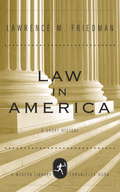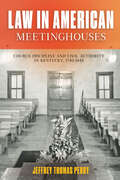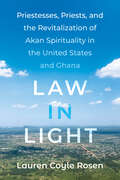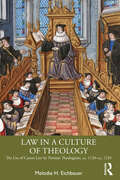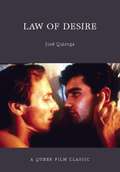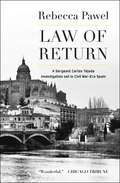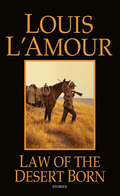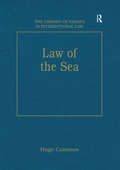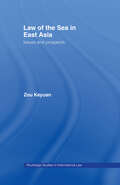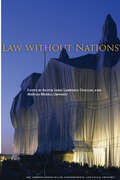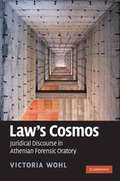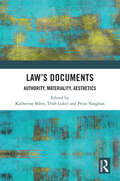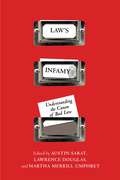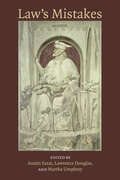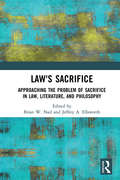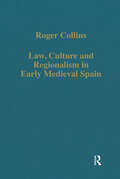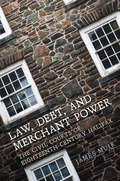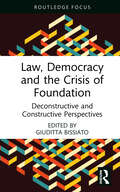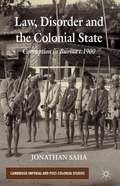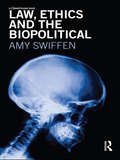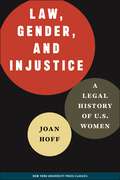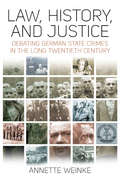- Table View
- List View
Law in America: A Short History (Modern Library Chronicles #Vol. 10)
by Lawrence M. FriedmanThroughout America's history, our laws have been a reflection of who we are, of what we value, of who has control. They embody our society's genetic code. In the masterful hands of the subject's greatest living historian, the story of the evolution of our laws serves to lay bare the deciding struggles over power and justice that have shaped this country from its birth pangs to the present. Law in Americais a supreme example of the historian's art, its brevity a testament to the great elegance and wit of its composition. From the Hardcover edition.
Law in American Meetinghouses: Church Discipline and Civil Authority in Kentucky, 1780–1845
by Jeffrey Thomas PerryA revealing look at the changing role of churches in the decades after the American Revolution.Most Americans today would not think of their local church as a site for arbitration and would probably be hesitant to bring their property disputes, moral failings, or personal squabbles to their kin and neighbors for judgment. But from the Revolutionary Era through the mid-nineteenth century, many Protestants imbued local churches with immense authority. Through their ritual practice of discipline, churches insisted that brethren refrain from suing each other before "infidels" at local courts and claimed jurisdiction over a range of disputes: not only moral issues such as swearing, drunkenness, and adultery but also matters more typically considered to be under the purview of common law and courts of equity, including disputes over trespass, land, probate, slave warranty, and theft. In Law in American Meetinghouses, Jeffrey Thomas Perry explores the ways that ordinary Americans—Black and white, enslaved and free—understood and created law in their local communities, uncovering a vibrant marketplace of authority in which church meetinghouses played a central role in maintaining their neighborhoods' social peace. Churches were once prominent sites for the creation of local law and in this period were a primary arena in which civil and religious authority collided and shaped one another. When church discipline failed, the wronged parties often pushed back, and their responses highlight the various forces that ultimately hindered that venue's ability to effectively arbitrate disputes between members. Relying primarily on a deep reading of church records and civil case files, Perry examines how legal transformations, an expanding market economy, and religious controversy led churchgoers to reimagine their congregations' authority. By the 1830s, unable to resolve doctrinal quibbles within the fellowship, church factions turned to state courts to secure control over their meetinghouses, often demanding that judges wade into messy ecclesiastical disputes. Tracking changes in disciplinary rigor in Kentucky Baptist churches from that state's frontier period through 1845, and looking beyond statutes and court decrees, Law in American Meetinghouses is a fresh take on church-state relations. Ultimately, it highlights an oft-forgotten way that Americans subtly repositioned religious institutions alongside state authority.
Law in Light: Priestesses, Priests, and the Revitalization of Akan Spirituality in the United States and Ghana
by Lauren Coyle RosenLaw in Light is a groundbreaking book on the resurgence and transformation of Akan path spiritual communities in the United States and Ghana. Drawing on extensive collaborative ethnographic research, the book offers powerful portraits of priestesses, priests, and others on their spiritual journeys, in their ancestral reconnections, and in their everyday lives. The book spotlights a queen mother, shrine elders, priests, and priestesses of a prominent shrine house in Maryland, as well as leaders at a legendary Asuo Gyebi source shrine in Ghana. In exploring worlds of healing, empowerment, and justice, Lauren Coyle Rosen argues for the importance of two novel theoretical concepts, which she calls copresent jurisdictions and constellations of subjectivity. The book urges a broader retheorization of alternative spiritual orders within contemporary theopolitical, cosmopolitical, and postjuristocratic debates.
Law in a Culture of Theology: The Use of Canon Law by Parisian Theologians, ca. 1120–ca. 1220
by Melodie H. EichbauerLaw in a Culture of Theology: The Use of Canon Law by Parisian Theologians, ca. 1120–ca. 1220 considers the study of law within its intellectual environment. It demonstrates that theologians associated with the schools of Paris in the twelfth century, particularly Peter the Chanter and his circle, had a working knowledge of Romano-canonical tradition and thought about the human context of the law, which, in turn, reflected the environment in which each master worked. It begins by showing the extent to which law was woven into the fabric of the schools of Paris, and follows with individual case studies.These case studies—marriage in Hugh of St. Victor’s De Sacramentis and Peter Lombard’s Sententiae, excommunication in Peter the Chanter’s Summa de sacramentis et animae consiliis, crusade activity and heresy in Robert of Couçon’s Summa penitentiae, homicide in Robert of Flamborough’s Liber poenitentialis, and the faces of greed in Thomas of Chobham’s Summa confessorum—demonstrate how each theologian drew upon legal thought, for what end he was using it, and how his use of law fit into contemporary legal thinking. A competency in law proved valuable to, and was tailored for, different types of ecclesiastical roles: teachers showing students how to analytically navigate complex questions of pastoral care, papal judge-delegate on the cusp of full-time administration on behalf of the papacy, penitentiarius of St. Victor and the students at the University of Paris, or diocesan management.This book will be a useful resource for all students and researchers interested in medieval canon law, medieval theology and pre-modern law.
Law of Desire: A Queer Film Classic
by José QuirogaLaw of Desire, one of three inaugural titles in Arsenal Pulp Press' new film book series Queer Film Classics, focuses on the 1987 homoerotic melodrama by Pedro Almodóvar, Spain's most successful contemporary film director.<P> The film Law of Desire is a grand tale of love, lust, and amnesia featuring three main characters: a gay film director (played by Eusebio Poncela); his sister, an actress who was once his brother (Carmen Maura); and a repressed, obsessive stalker (a young Antonio Banderas). In the twenty-plus years since its first release, Law of Desire has been acknowledged as redefining the way in which cinema can portray the difficult affective relationships between homosexuality, gender, and sex. Taking his cue from the golden age of Latin American, American, and European melodrama, Almodóvar created a sentimental yet hard-edged film that believes in the utopian possibilities for new relationships that redeem people from their despair. Since its release, Almodóvar has become an Oscar-winning filmmaker who regularly delves into issues of sexuality, gender, and identity.<P> This book examines the political and social context in which Almodóvar created Law of Desire, as well as its impact on LGBT cinema both in Europe and around the world.
Law of Return (A Sergeant Carlos Tejada Investigation #2)
by Rebecca PawelThis murder mystery set in Fascist Spain is &“a colorful, thrilling story about loyalty and love&” (Detroit Free Press). Spain, 1940: Lt. Carlos Tejada has been transferred to Salamanca, where he studied law before the Spanish Civil War. His new duties include monitoring parolees—former professors who were fired for protesting against Franco. The policeman&’s old love, Elena Fernandez, has also lost her job because of her political leanings, and has returned home to Salamanca from Madrid. Her father, once a distinguished classics professor, is now one of the parolees—and has just received a letter from a Jewish friend, begging for help to cross into Spain from France to avoid being forcibly repatriated to Nazi Germany. Professor Fernandez cannot violate his parole by traveling—so Elena goes in his stead, and not longer after does her path cross with the lieutenant&’s, and soon they will find themselves involved in a murder case with far-reaching implications. From an Edgar Award–winning author, this is a &“strongly atmospheric&” novel filled with history and intrigue (The Baltimore Sun).
Law of the Desert Born: Stories
by Louis L'AmourThese stories represent Louis L'Amour at his best--stirring adventure tales of the ageless Old West, as tough and gritty as the men who tames it. Each story is personally selected, with an introduction and special historical notes, by the author.Meet men like Shad Marone, the gunfighter who killed in self-defense, but who is forced to run because he killed the wrong man--the sheriff's brother; Matt Sabre, as tough as the Texas trail he rides, on a mission of mercy to the wife of the man he gunned down; and Kim Sartain, a reckless young drifter who refuses to back down from a showdown with a vicious outlaw killer. Every story in this collection bear's Louis L'Amour's distinctive brand of unbridled action and unembellished authenticity--taking us into the white-hot deserts, stone-cold canyons, and rough-and-tumble towns of the world only he knows so well.From the Paperback edition.
Law of the Land
by Greg TaylorHow was it that the Torrens system, a mid-nineteenth-century reform of land titles registration from distant South Australia, gradually replaced the inherited Anglo-Canadian common law system of land registration? In The Law of the Land, Greg Taylor traces the spread of the Torrens system, from its arrival in the far-flung outpost of 1860s Victoria, British Columbia, right up to twenty-first century Ontario.Examining the peculiarity of how this system of land reform swept through some provinces like wildfire, and yet still remains completely unknown in three provinces, Taylor shows how the different histories of various regions in Canada continue to shape the law in the present day. Presenting a concise and illuminating history of land reform, he also demonstrates the power of lobbying, by examining the influence of both moneylenders and lawyers who were the first to introduce the Torrens system to Canada east of the Rockies.An exact and fluent legal history of regional law reforms, The Law of the Land is a fascinating examination of commonwealth influence, and ongoing regional differences in Canada.
Law of the Sea (The\library Of Essays In International Law Ser. #3)
by Hugo CaminosThis series brings together the most significant published journal articles in international law as determined by the editors of each volume in the series. The proliferation of law, specialist journals, the increase in international materials and the use of the internet has meant that it is increasingly difficult for students and legal scholars to have access to all the relevant articles. Many valuable older articles are unable to be obtained readily. In addition each volume contains an informative introduction which provides an overview of the subject matter and justification of why the articles were collected. This series contains collections of articles in a manner that is of use for both teaching and research.
Law of the Sea in East Asia: Issues and Prospects (Routledge Studies in International Law #5)
by Keyuan ZouLaw of the Sea in East Asia selects the most prominent maritime legal issues that have emerged since the post-LOS Convention era for a detailed discussion and assessment. The current marine legal order in East Asia is based on the 1982 United Nations Convention on the Law of the Sea (LOS Convention) and accordingly coastal states in the region are obliged to cooperate amongst themselves to exercise their rights and perform their duties. Keyuan, a respected expert in the fields of international and Chinese law, explores issues concerning compliance with the law of the sea, territorial disputes and maritime boundary delimitation, fishery management, safety of navigation and maritime security, and neglected issues in the law of the sea. This is the first book to examine maritime laws in East Asia, and as such will appeal to academics of law and Asian studies, lawyers and policy makers.
Law without Nations
by Austin Sarat Lawrence Douglas Martha UmphreyAs the editors (all of Amherst College) explain in their introduction, how one conceptualizes the idea of "law without nations" depends very much on how one theorizes "the nation." A Hobbesian view of the nation as the state suggests that there can be no such thing as "law without nations." The development of doctrines of international crimes such as genocide suggests that law can exist above and beyond the nation, however defined. Understanding "the nation" either in the sense of the German concept of "das Volk" or as an expression of social solidarity (without, necessarily, the exclusivist connotations of "das Volk") can lead to an understanding of the law as embodying and expressing "matters of tradition, affect, belief, and ultimate values," and thus "law without nations" suggests either an impossibility or the imposition of artificial legality from the outside. Finally, in liberal legality, which sees law as the creator of social solidarity and the vehicle for promoting social justice, "law without nations" can be understood as the culmination of the liberal ideal. It is the tensions between these different ways of understanding "law without nations" that animate the six essays presented here, which explore such specific topics as the legal relationship between the nation-state and a globalized world as pertaining to the punishment of crime and the waging of war; issues of comparative constitutionalism (the US Supreme Court citing decisions of foreign domestic national courts, for instance); the conceptual development of Jewish law in the absence of a state for the nation; the recent development of Islamic Sharia Law as a form of supranational legality arising out of the void of failing states; international law as a facilitator of ethnic displacement and exclusion; and law within a liberal multinational empire. Annotation ©2011 Book News, Inc., Portland, OR (booknews.com)
Law's Cosmos
by Victoria WohlRecent literary-critical work in legal studies reads law as a genre of literature, noting that Western law originated as a branch of rhetoric in classical Greece and lamenting the fact that the law has lost its connection to poetic language, narrative, and imagination. But modern legal scholarship has paid little attention to the actual juridical discourse of ancient Greece. This book rectifies that neglect through an analysis of the courtroom speeches from classical Athens, texts situated precisely at the intersection between law and literature. Reading these texts for their subtle literary qualities and their sophisticated legal philosophy, it proposes that in Athens' juridical discourse literary form and legal matter are inseparable. Through its distinctive focus on the literary form of Athenian forensic oratory, Law's Cosmos aims to shed new light on its juridical thought, and thus to change the way classicists read forensic oratory and legal historians view Athenian law.
Law's Documents: Authority, Materiality, Aesthetics
by Katherine Biber, Trish Luker and Priya VaughanIlluminating their breadth and diversity, this book presents a comprehensive and multidisciplinary view of legal documents and their manifold forms, uses, materialities and meanings. In 1951, Suzanne Briet, a librarian at the Bibliotheque Nationale in Paris, famously said that an antelope in a zoo could be a document, thereby radically changing the way documents were analysed and understood. In the fifty years since this pronouncement, the digital age has introduced a potentially limitless range of digital and technological forms for the capture and storage of information. In their multiplicity and their ubiquity, documents pervade our everyday life. However, the material, intellectual, aesthetic and political dimensions and effects of documents remain difficult to pin down. Taking a multidisciplinary and international approach, this collection tackles the question, what is a legal document?, in order to explore the material, aesthetic and intellectual attributes of legal documentation; the political and colonial orders reflected and embedded in documents; and the legal, archival and social systems which order and utilise information. As well as scholars in law, documentary theory, history, Indigenous studies, art history and design theory and practice, this book will also appeal to those working in libraries, archives, galleries and museums, for whom the ongoing challenges of documentation in the digital age are urgent and timely questions.
Law's Empire
by Ronald M. DworkinWith the incisiveness and lucid style for which he is renowned, Ronald Dworkin has written a masterful explanation of how the Anglo-American legal system works and on what principles it is grounded. Law's Empire is a full-length presentation of his theory of law that will be studied and debated--by scholars and theorists, by lawyers and judges, by students and political activists--for years to come. Dworkin begins with the question that is at the heart of the whole legal system: in difficult cases how do (and how should) judges decide what the law is? He shows that judges must decide hard cases by interpreting rather than simply applying past legal decisions, and he produces a general theory of what interpretation is--in literature as well as in law--and of when one interpretation is better than others. Every legal interpretation reflects an underlying theory about the general character of law: Dworkin assesses three such theories. One, which has been very influential, takes the law of a community to be only what the established conventions of that community say it is. Another, currently in vogue, assumes that legal practice is best understood as an instrument of society to achieve its goals. Dworkin argues forcefully and persuasively against both these views: he insists that the most fundamental point of law is not to report consensus or provide efficient means to social goals, but to answer the requirement that a political community act in a coherent and principled manner toward all its members. He discusses, in the light of that view, cases at common law, cases arising under statutes, and great constitutional cases in the Supreme Court, and he systematically demonstrates that his concept of political and legal integrity is the key to Anglo-American legal theory and practice.
Law's Infamy: Understanding the Canon of Bad Law
by UnknownAn analysis of how problematic laws ought to be framed and consideredFrom the murder of George Floyd to the systematic dismantling of voting rights, our laws and their implementation are actively shaping the course of our nation. But however abhorrent a legal decision might be—whether Dred Scott v. Sanford or Plessy v. Ferguson—the stories we tell of the law’s failures refer to their injustice and rarely label them in the language of infamy. Yet in many instances, infamy is part of the story law tells about citizens’ conduct. Such stories of individual infamy work on both the social and legal level to stigmatize and ostracize people, to mark them as unredeemably other. Law’s Infamy seeks to alter that course by making legal actions and decisions the subject of an inquiry about infamy. Taken together, the essays demonstrate how legal institutions themselves engage in infamous actions and urge that scholars and activists label them as such, highlighting the damage done when law itself acts infamously and focus of infamous decisions that are worthy of repudiation. Law's Infamy asks when and why the word infamy should be used to characterize legal decisions or actions. This is a much-needed addition to the broader conversation and questions surrounding law’s complicity in evil.
Law's Mistakes
by Austin Sarat Lawrence Douglas Martha Merrill UmphreyFrom false convictions to botched executions, from erroneous admission of evidence in a criminal trial to misunderstandings that arise in the process of creating contracts, law is awash in mistakes. These mistakes can be unintentional deviations from expected practices or the result of intentional actions that produce unintended negative consequences. They may become part of a process of response and correction or be accepted as an inevitable cost of action. Some mistakes are external to law itself, such as errors in an agreement made by two private parties. Others are made by legal actors in the course of their work; for example, a police officer’s failing to obtain a search warrant when one was required. The essays in Law’s Mistakes explore the things that law recognizes as errors and the way it responds to them. They identify the jurisprudential and political perspectives that underlie different understandings of what is or is not a legal mistake, and examine the fraught, contested, and evolving relationship between law and error. And they offer templates for thinking about what mistakes can tell us about the aspirations and limits of law, and for understanding how our imagining of law is enabled and shaped by its juxtaposition to a condition labeled mistake. In addition to the volume editors, contributors include Paul Schiff Berman, Sonali Chakravarti, Jody L. Medeira, Stewart Motha, Kunal Parker, and Jordan Steiker.
Law's Sacrifice: Approaching the Problem of Sacrifice in Law, Literature, and Philosophy
by Brian W. Nail Jeffrey A. EllsworthThis volume examines the relationship between law and sacrifice as a crucial nexus for theorizing the dynamics of creation, destruction, transcendence, and violence within the philosophical and legal discourse of western society. At a time of populist political unrest, what philosophical and theoretical resources are available for conceptualizing the discontent that seems to emanate from practically every sphere of society? What narrative strategies have been employed within literary, theological, philosophical, and legal discourse to tame or mystify human violence? Engaging with the work of preeminent theorists of sacrifice, such as Georges Bataille, René Girard, Giorgio Agamben, and Jacques Derrida this collection examines from an interdisciplinary perspective the sacrificial logic that characterizes the cultural and political dynamics of law in society. The book will be of interest to students and scholars in the field of legal theory and philosophy.
Law, Culture and Regionalism in Early Medieval Spain (Variorum Collected Studies)
by Roger CollinsRoger Collins deals here with the history of Spain, specifically Christian Spain, in the period from the 6th to the 10th century - from the Visigoths, through the time of the Arab conquests, up to the end of the era of Carolingian dominance across the Pyrenees. Particular emphasis, indeed, is placed upon the importance of this Pyrenean region, in the lands now known as France as well as those in Spain, with the author also calling into question the received notion of an Aquitanian identity in the 5th-9th centuries. Of the themes running through this volume, that of regionalism is most evident here and in the articles on the Basques, but appears equally, for instance, in the study on the relations between Merida and the Visigothic government. Similarly, legal and cultural themes provide the focus for the articles on the workings of Visigothic law in the 9th-10th centuries, or on the intellectual culture of Navarre, but recur in other parts of the collection. Two of these articles appear for the first time in English, while a third has been re-written for this volume and others supplied with additional notes or illustrations. Roger Collins traite ici de l’histoire d’Espagne et, plus particulièrement, de celle de l’Espagne chrétienne entre le 6e et le 10e siècle: des Visigoths jusqu’à la fin de l’hégémonie carolingienne au nord du pays, en passant par les conquêtes arabes. L’importance de la région pyrénéenne, recouvrant des terres qui font de nos jours partie de la France ainsi que de l’Espagne, est soulignée par l’auteur, qui remet par ailleurs en question l’idée reçue d’identité aquitaine qui prévalait entre le 5e et le 9e siècle. Certains thèmes légaux et culturels forment la base d’articles sur le fonctionnement du droit visigoth aux 9e et 10e siècles, ou encore sur la culture intellectuelle de la Navarre et ressurgissent à d’autres endroits de la collection. Le régionalisme reste cependant le plus prédominant
Law, Debt, and Merchant Power: The Civil Courts of 18th Century Halifax
by The Osgoode Society James MuirIn the early history of Halifax (1749-1766), debt litigation was extremely common. People from all classes frequently used litigation and its use in private matters was higher than almost all places in the British Empire in the 18th century. In Law, Debt, and Merchant Power, James Muir offers an extensive analysis of the civil cases of the time as well as the reasons behind their frequency. Muir's lively and detailed account of the individuals involved in litigation reveals a paradoxical society where debtors were also debt-collectors. Law, Debt, and Merchant Power demonstrates how important the law was for people in their business affairs and how they shaped it for their own ends.
Law, Democracy and the Crisis of Foundation: Deconstructive and Constructive Perspectives (Law and Politics)
by Giuditta BissiatoThis book addresses the crisis of the juridical-political foundation within contemporary democracies.Although modernity is the age of foundation, it is marked by what Carl Schmitt referred to as a peculiar ‘dialectic of presence and absence’ – and this is true even for those theories that seem to be the greatest supporters of the necessity of some kind of foundation, such as the Hobbesian commonwealth. This instability of foundation is inherent in the concept of ‘political representation’, which brings into being an idea – such as that of ‘nation’, ‘people’ or ‘popular will’ – which cannot, however, actually correspond to any empirical reality. Is it possible, then, to identify an absolute, certain and stable foundation capable of generating and guaranteeing the persistence of a legal and political structure? Or does this very question bind us to the history of an impossibility: a foundational absence, or void, whose presence is only now being strongly felt? Engaging both historical and contemporary perspectives, this book addresses the problem of foundation through both deconstructive and constructive perspectives – which respectively aim to challenge the very idea of foundation, or to overcome its contemporary crisis in order to present new, post-foundational possibilities.This book will be of interest to scholars and researchers working in the areas of legal and political theory.
Law, Disorder and the Colonial State
by Jonathan SahaIn this original study British rule in Burma is examined through quotidian acts of corruption. Saha outlines a novel way to study the colonial state as it was experienced in everyday life, revealing a complex world of state practices where legality and illegality were inseparable: the informal world upon which formal colonial power rested.
Law, Ethics and the Biopolitical
by Amy SwiffenLaw, Ethics and the Biopolitical explores the idea that legal authority is no longer related to national sovereignty, but to the ‘moral’ attempt to nurture life. The book argues that whilst the relationship between law and ethics has long been a central concern in legal studies, it is now the relationship between law and life that is becoming crucial. The waning legitimacy of conventional conceptions of sovereignty is signalled the renewal of a version of natural law, evident in discourses of human rights, that de-emphasises the role of a divine law-giver in favour of an Aristotelian conception of the natural purpose of life and the ‘common good’. Synthesising elements of legal scholarship on sovereignty, theories of biopolitics and biopower, as well as recent developments in the domains of ethics, Amy Swiffen examines the invocation of ‘life’ as a foundation for legal authority. The book documents the connection between law, life and contemporary forms of biopolitical power by critically analysing the fundamental principles of the bioethical paradigm. Unique in its critical and cross-disciplinary approach, Law, Ethics and the Biopolitical will be of interest to students and teachers in the areas of law and society, law and literature, critical legal studies, social theory, bioethics, psychoanalysis, and biopolitics.
Law, Gender, and Injustice: A Legal History of U.S. Women (Feminist Crosscurrents)
by Joan HoffA groundbreaking analysis of how gendered oppression is written into the American legal systemLaw, Gender, and Injustice: A Legal History of U.S. Woman is a landmark study of how women remain second-class citizens under the current legal system. In this widely acclaimed book, Joan Hoff questions whether the continued pursuit of equality based on a one-size-fits-all vision of traditional individual rights is really what will most improve conditions for women in America. Concluding that equality based on liberal male ideology is no longer an adequate framework for improving women's legal status, Hoff's highly original and incisive volume calls for a demystification of legal doctrine and a reinterpretation of legal texts (including the Constitution) to create a feminist jurisprudence.
Law, History, and Justice: Debating German State Crimes in the Long Twentieth Century
by Annette WeinkeSince the nineteenth century, the development of international humanitarian law has been marked by complex entanglements of legal theory, historical trauma, criminal prosecution, historiography, and politics. All of these factors have played a role in changing views on the applicability of international law and human-rights ideas to state-organized violence, which in turn have been largely driven by transnational responses to German state crimes. Here, Annette Weinke gives a groundbreaking long-term history of the political, legal and academic debates concerning German state and mass violence in the First World War, during the National Socialist era and the Holocaust, and under the GDR.
Law, History, and Justice: Debating German State Crimes in the Long Twentieth Century
by Annette WeinkeSince the nineteenth century, the development of international humanitarian law has been marked by complex entanglements of legal theory, historical trauma, criminal prosecution, historiography, and politics. All of these factors have played a role in changing views on the applicability of international law and human-rights ideas to state-organized violence, which in turn have been largely driven by transnational responses to German state crimes. Here, Annette Weinke gives a groundbreaking long-term history of the political, legal and academic debates concerning German state and mass violence in the First World War, during the National Socialist era and the Holocaust, and under the GDR.
